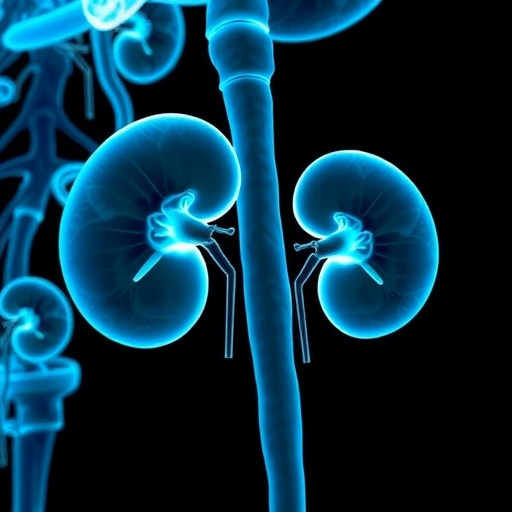Recent research has delved deep into the interplay between plasma testosterone levels and the progression of diabetic nephropathy, particularly in males. This groundbreaking study, conducted by a team led by researchers including Tang, K., Du, C., and Zhou, W., has shed light on a connection that could influence future treatment pathways for diabetes-induced kidney complications. As diabetes continues to surge globally, understanding its complications becomes increasingly vital.
Diabetic nephropathy, a common and serious complication of diabetes, leads to progressive kidney damage and can eventually result in end-stage renal disease. Characterized by a gradual decline in kidney function, it remains a leading cause of morbidity among diabetic patients. The intricate mechanisms underlying diabetic nephropathy are not fully understood, but recent advancements in research point towards various hormonal influences, with testosterone being a significant player.
This study aims to elucidate the relationship between plasma testosterone levels and the progression of diabetic nephropathy in men. Testosterone, primarily known as a male sex hormone, has been observed to influence various metabolic functions—ranging from insulin sensitivity to vascular health. The complexity of its effects is particularly relevant when assessing its role in chronic conditions like diabetes.
One of the pivotal aims of Tang et al. was to assess whether lower testosterone levels correlate with worsening kidney function in males with diabetes. A wealth of data was analyzed to understand whether variations in testosterone concentrations could predict the trajectory of kidney disease in this specific patient population. Interestingly, this perspective challenges the conventional view that testosterone primarily serves reproductive functions, opening new avenues for understanding its broader health implications.
The researchers utilized a vast database of diabetic patients, assessing their testosterone levels alongside routine clinical parameters of kidney function, such as serum creatinine and urinary albumin excretion. The meticulous design of the study allowed for a comprehensive understanding of not only testosterone levels but also age, duration of diabetes, and other comorbidities that could potentially confound the results.
One of the remarkable findings highlighted that men with lower testosterone levels displayed a statistically significant decline in renal function over time. This association was compelling enough to suggest that testosterone may have a nephroprotective effect, implying that optimal levels of this hormone might play a crucial role in safeguarding kidney health among diabetic males.
Moreover, the study also considered the mechanisms through which testosterone might influence kidney function. The researchers postulated that testosterone could modulate inflammatory pathways, reduce oxidative stress, and improve endothelial function, all of which are vital in maintaining renal health. These insights not only enhance our understanding of disease pathology but also pave the way for innovative therapeutic strategies aimed at improving testosterone levels in affected individuals.
While the study presents robust evidence linking testosterone levels and diabetic nephropathy progression, it does not come without its limitations. The observational nature of the research makes it inherently challenging to establish direct causation. The authors have urged for further experimental and clinical studies to corroborate these findings and better elucidate the underlying biological mechanisms involved. Thus, the quest for understanding the sex differences in diabetes continues, and testosterone’s role presents an intriguing area for exploration.
In light of these findings, potential implications for clinical practice arise. If confirmed, clinicians may need to monitor testosterone levels in their male diabetic patients more closely, considering testosterone supplementation as a possible adjunct therapeutic strategy for preserving kidney function. The landscape of diabetes management could significantly shift if hormonal balances are recognized as critical components contributing to the overall health of diabetic patients.
Given the complexity of diabetes-related complications and the multifactorial nature of hormone levels, it is essential to approach these findings with caution. The intersection of endocrinology and nephrology is poised to grow in importance, reflecting the need for a more integrated approach to managing chronic diseases like diabetes. The trends observed in this study highlight the importance of personalized medicine, wherein treatments would be tailored based on individual physiological profiles, including hormonal status.
In conclusion, the research by Tang and colleagues opens up a significant chapter in our understanding of diabetic nephropathy. By identifying testosterone’s potential role in kidney health, the study seeds hope for more targeted interventions that could improve the lives of countless men facing the dual challenges of diabetes and its associated complications. As the global diabetes epidemic continues, it is imperative that research continues in these less-charted territories, paving the way for a future where diabetic complications like nephropathy can be effectively managed and potentially prevented.
Further explorations into how testosterone levels interact with other hormones, such as estrogen and cortisol, could provide more insights into this complex relationship. Interdisciplinary research that combines insights from endocrinology, nephrology, and diabetes management could unlock new therapeutic possibilities, benefitting patients who suffer from these intertwined health challenges.
Lastly, with advances in precision medicine, future studies may utilize genetic and molecular profiling to determine who among the diabetic population could benefit the most from hormonal interventions. The implications extend beyond managing existing conditions—healthy testosterone levels could potentially act as a preventative measure against diabetic nephropathy, marking a transformative step in diabetes care and management.
Subject of Research: Association of plasma testosterone level and progression of diabetic nephropathy in male patients.
Article Title: The association of plasma testosterone level and progression of diabetic nephropathy in male.
Article References:
Tang, K., Du, C., Zhou, W. et al. The association of plasma testosterone level and progression of diabetic nephropathy in male.
BMC Endocr Disord 25, 246 (2025). https://doi.org/10.1186/s12902-025-02073-1
Image Credits: AI Generated
DOI: https://doi.org/10.1186/s12902-025-02073-1
Keywords: Diabetic nephropathy, testosterone, male health, diabetes, nephrology, endocrinology, kidney function.
Tags: chronic kidney disease and diabetesdiabetes-induced kidney complicationsdiabetic nephropathy in malesend-stage renal disease and diabeteshormonal influences on kidney healthmale sex hormone and diabetesmetabolic functions of testosteroneplasma testosterone levels and diabetic nephropathyprogression of diabetes complicationsresearch on testosterone and kidney functiontestosterone effects on insulin sensitivityunderstanding diabetic nephropathy mechanisms





